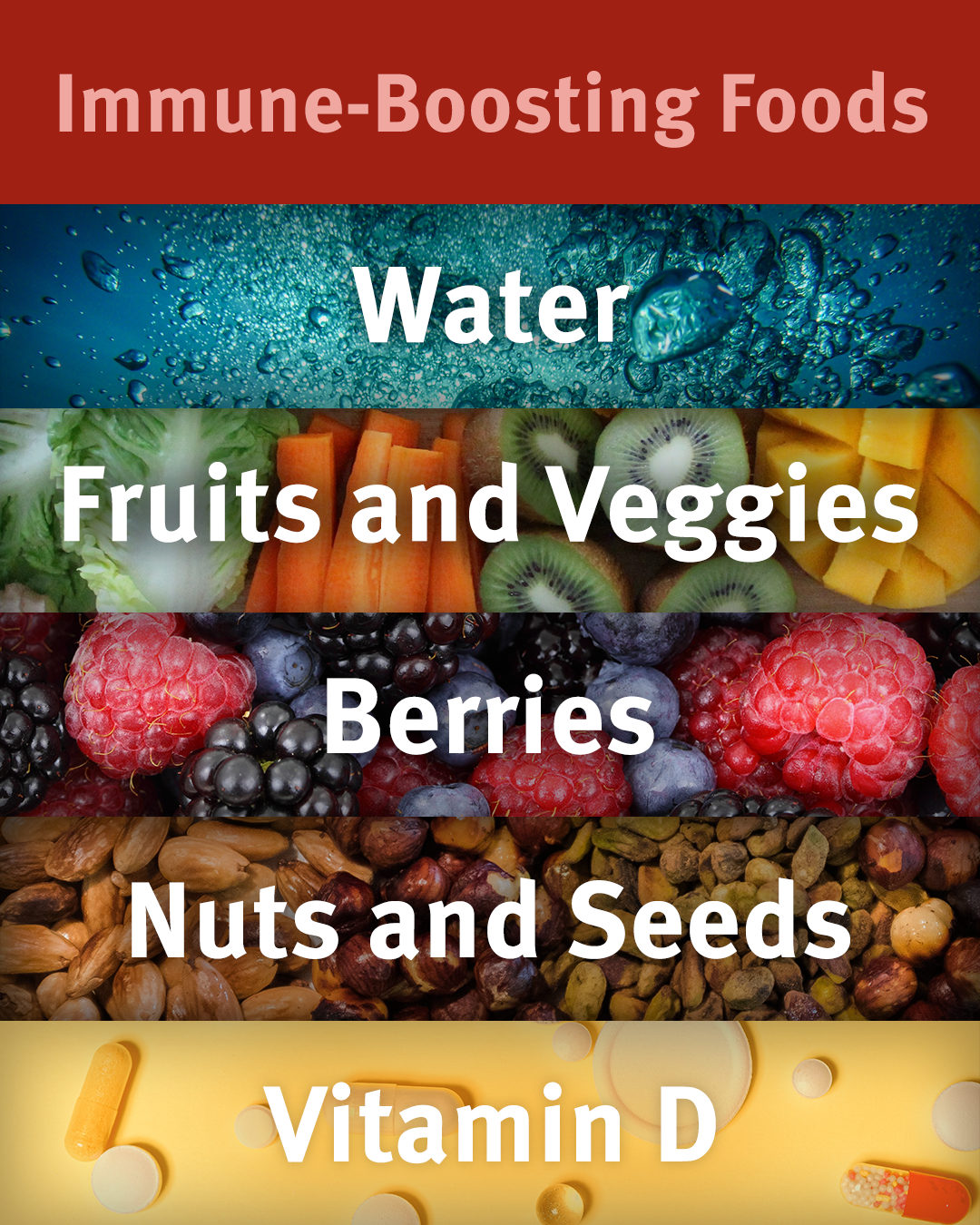What we feed our bodies affects its ability to resist and fight-off disease. Inadequate nutrition can compromise our body’s defense and its response to foreign invaders, while conscious dieting can optimize its ability to resist disease. It’s therefore important we be mindful of our diet to ensure that our bodies have the tools needed to heal and recover.
Diet can be broken up into several basic categories. The following food groups and types are excellent sources of nutrients that directly support the immune system.
Water
As simple as it sounds, water is an essential part of our well-being. Sticking to water as opposed to diuretic beverages like alcohol, coffee, and sugary drinks is ideal. Hydration is especially important during winter and early spring, as colder and drier weather can leave the respiratory lining susceptible to infection.
Fruits and Vegetables
Fruits and vegetables offer countless benefits to our body. These are rich in vitamins, minerals, and antioxidants that our body needs to function and keep our organs healthy. They are nutrient dense, meaning that they offer more nutrients per calorie than most other foods.
Fiber from fruits and vegetables promotes a healthy digestive tract, where they act as prebiotics. This is extremely important! Our gut plays a key role in the absorption of nutrients and in supporting the immune system. A healthy gut allows the body to reap the full benefits of the nutrients consumed.
Berries
Berries are packed with antioxidants that protect our body from all sorts of wear and tear. Antioxidants work by neutralizing free radicals, reactive molecules that would otherwise react with important micro-biological structures and render them useless.
Berries are also abundant in phytochemicals (“plant-” chemicals), which are becoming more and more recognized as important to our health. Examples of phytochemicals includes flavonoids, carotenoids, anthocyanins, sulfides, thiols, and many many more. Phytochemicals are the most effective when consumed in their natural form, not as a supplement.

Nuts and Seeds
Nuts and seeds are a good source of healthy (poly-unsaturated and mono-unsaturated) fats. Examples include plant-based oils (liquid at room temperature), omega-6 and omega-3 fatty acids. Omega-3 fatty acids have been linked to immune support and function, eliciting a supporting effect on phagocytic cells like neutrophils and macrophages. Nuts and seeds are also packing with energy and are phytochemicals, making them a no-brainer when it comes to immune support.
Vitamin D
Vitamin D, also known as the “sunshine vitamin,” is a miracle worker when it comes to immunity. Adequate levels of vitamin D ensure that we have strong bones and a strong immune system. Supplementing with vitamin D has been found to lower the likelihood of upper respiratory tract infections as well as shorten the illness. Vitamin D also has antioxidant properties that protect with oxidative damage and has a stabilizing effect on mood.
 Sunshine has a bigger impact on health than most would think. Simply going outside and getting some sunshine can boost your mood, energy levels, and immune function. This connection between sunlight and health sheds some light our synergistic relationship with nature.
Sunshine has a bigger impact on health than most would think. Simply going outside and getting some sunshine can boost your mood, energy levels, and immune function. This connection between sunlight and health sheds some light our synergistic relationship with nature. The light stimulation from the sun helps regulate the circadian rhythm- a daily rhythm of hormone oscillations that follow roughly a 24-hour cycle. Melatonin is perhaps the most well-known hormone that follows this pattern. The circadian rhythm is key to getting good sleep at night and being productive during the day.
The light stimulation from the sun helps regulate the circadian rhythm- a daily rhythm of hormone oscillations that follow roughly a 24-hour cycle. Melatonin is perhaps the most well-known hormone that follows this pattern. The circadian rhythm is key to getting good sleep at night and being productive during the day.